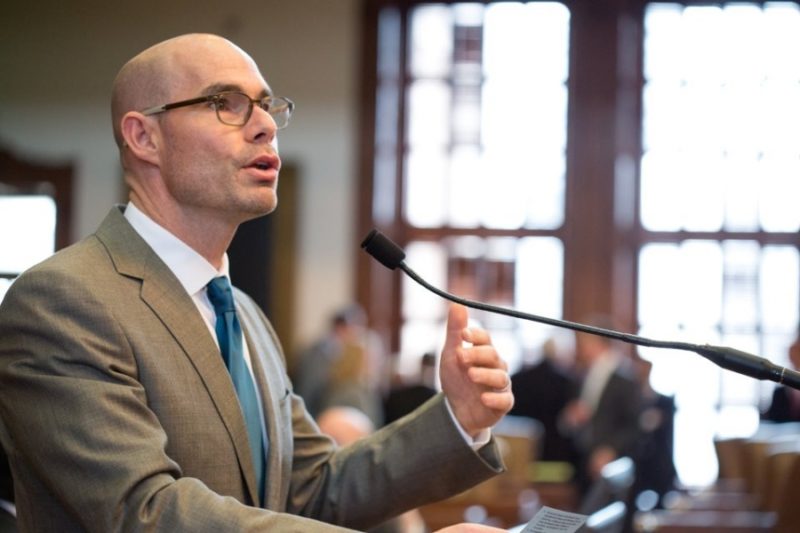The liberal wing of the Texas House Republican Caucus, which ruled the chamber since 2005 through an alliance with Democrats, faces a challenge from a conservative, mid-caucus group that has formed behind Rep. Dennis Bonnen.
Dennis Bonnen, together with his brother Greg, were the most conservative members in the coalition behind Speaker Joe Straus, the centrist Republican who infuriated the party’s Tea Party wing by defying them on property tax legislation, the “bathroom bill,” and other issues.
Bonnen does not, however, belong to the farthest right faction of the House GOP, the Freedom Caucus, which has yet to name its own candidate for the speakership.
His candidacy further divides a Straus-era group of leaders who had already put forward five speaker candidates – Four Price, Drew Darby, Phil King, Travis Clardy, and Tan Parker – as well as John Zerwas, who withdrew this week to support Bonnen.
Bonnen, with Zerwas’ support, his brother’s, and reportedly also John Wray’s and Dade Phelan’s, now controls a small but important corner of the group of roughly two dozen mostly centrist and mid-caucus Republicans who had threatened to cut a deal with Democrats by declining to sign a party-mandated Speaker Selection Form.
Another six Bonnen supporters belong to the farthest right wing of the party, according to a list published by Michael Quinn Sullivan, President of Empower Texans, a conservative group whose affiliated political action arm has donated to several of the most conservative members of the Texas House.
However, the largest number of Bonnen backers belong to a mid-caucus group of conservatives who are neither at the far right nor Straus-style centrists willing to work with Democrats to select a speaker. The significance of Bonnen’s bid therefore lies in the possibility that he could emerge as a compromise candidate who is able to stave off GOP infighting between Tea Party conservatives and a Straus successor faction aligned with Democrats.
The GOP caucus will meet December 1 to try to choose a single nominee. The actual vote for the speakership will take place in January when the legislature convenes for the first time since August 2017.
“Bonnen could emerge as a compromise candidate able to stave off GOP infighting between Tea Party conservatives and a Straus successor faction.”
In statements yesterday, both Bonnen brothers stressed their commitment to the GOP caucus process. Two other speaker candidates who sit roughly in the middle of the caucus – Phil King and Tan Parker – have done likewise. Parker told Honest Austin today, “I continue to campaign daily for Speaker of the Texas House.” He noted that he did not attend a meeting of roughly 40 GOP members who met Sunday to draft Bonnen for the race, as none of the speaker candidates were invited.
Speaker candidates Travis Clardy and Drew Darby, ranked by one study as the third- and thirteenth-most liberal members of the GOP Caucus, respectively, have declined to commit to limit themselves to the caucus process and could court Democratic support.
Every House seat is up for election in November, which means it is not known now whether the current balance of 95 Republicans and 55 Democrats will remain. However, the balance of power is not expected to shift significantly. Democratic Caucus Chairperson Senfronia Thompson yesterday wrote to fellow Democrats in the House urging them to remain “impartial” until a Democratic committee finishes meeting with speaker candidates.
Seventy-six votes are needed to elect the next speaker in the 150-member House. This means a coalition of 75 Democrats with as few as 21 Republicans could pick a speaker over the will of the Republican Caucus majority.
Such a deal with Democrats would be anathema to the “movement conservatives” who occupy the right wing of the party. Empower Texans Vice President Cary Cheshire wrote in September that his group wants to see a Speaker who wins first a majority in the Republican Caucus, thereby becoming the caucus’ formal nominee.
“A speaker candidate must have a record of supporting conservative reforms even when doing so in the past required opposition to leadership. A speaker candidate must make a public, on-the-record pledge to bring specific conservative reforms to the House floor for debate and a vote,” Cheshire stated.
Dennis Bonnen, in his statement yesterday announcing his candidacy said, “This is a decision I have made after thoughtful consideration with my family and the encouragement of my constituency and my colleagues, for which I am deeply grateful. I am truly humbled by the support I have received preceding and following this announcement.”
The Republican of Angleton has earned a reputation as occasionally combative. He was called the “enfant terrible of the House” by Texas Monthly during the 2011 session, though the same magazine in 2015 named him one of the legislature’s ten best members. Elsewhere, Bonnen has said that he has evolved as a leader during his years in the House, which he joined when he was 24.
Bonnen clashed with the chief of the Texas Senate, Lt-Gov. Dan Patrick, during the 2015 session, and publicly derided him as a Washington-style politician.
During the 2017 session, he chaired the Ways and Means Committee and served also on the Culture, Recreation and Tourism Committee. Bonnen also works as the chairman and CEO of a community bank. He is a graduate of Saint Edward’s University.
Notice of Corrections:
(1) This article has been updated to reflect that Empower Texans does not identify itself as a ‘Tea Party’ group, as originally stated.
(2) A quotation earlier attributed to Michael Quinn Sullivan actually had been attributed by him to his VP Cary Cheshire. The article has been updated to reflect that.
